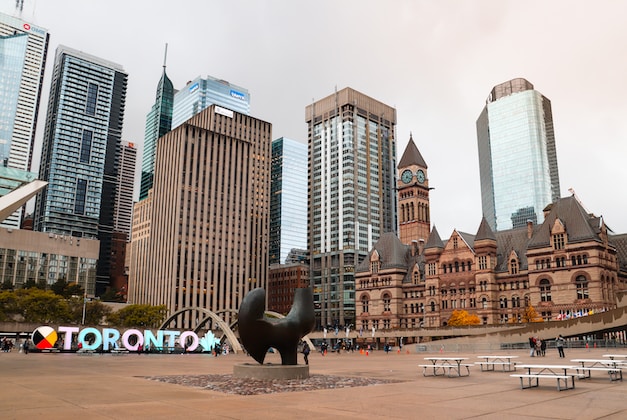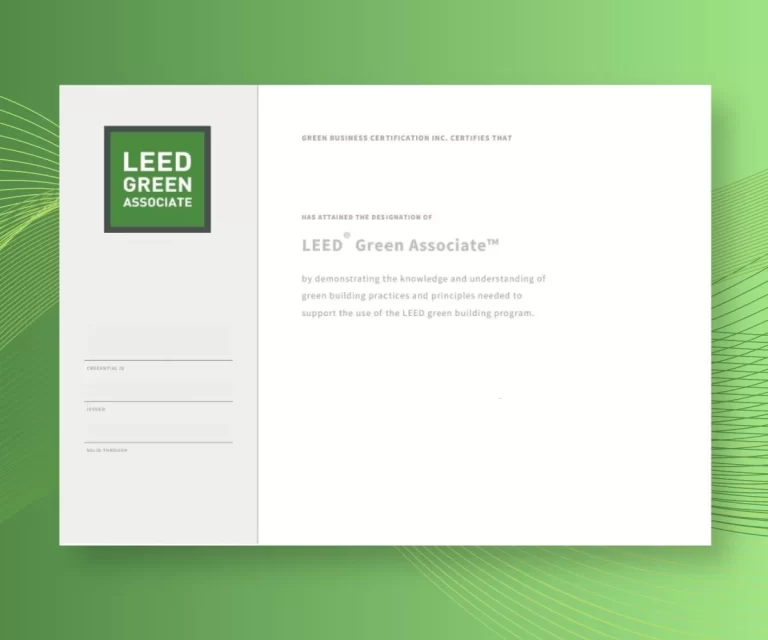In our quest to further delve into the practical cases of LEED certification, Toronto catches the attention as one of the cities with an ever-rising number of LEED certified buildings. In this article, we explore the dynamic intersection of built environment and sustainability through LEED certification in Toronto, a city at the forefront of Canada’s green revolution.
Importance Of Sustainability In Canada And In Toronto
Canada is at the forefront of the sustainable revolution, making tremendous progress in reducing greenhouse gas emissions. Not only is the consumption of fossil fuels encouraged to be reduced, but also the Canadian government invests in renewable power sources such as wind and solar energy. These efforts have already yielded fruits: almost 80% of electricity is generated through sustainable methods. Canada also made the list at the second place globally for the Top 10 countries and regions for LEED in 2021.
Canada Green Building Council reports that nearly 30% of greenhouse gas emissions and 35% of landfill waste in the country are generated by buildings. At the same time, the water consumption (municipal water) reaches 70%. Canada has turned to green building, and LEED, in its effort to prioritize sustainable practices. Now, Canada is one of the top in the world for LEED certification and sustainability with over 5500 LEED certified buildings.
Read more: LEED certification and LEED accreditation – 7 critical things you need to know
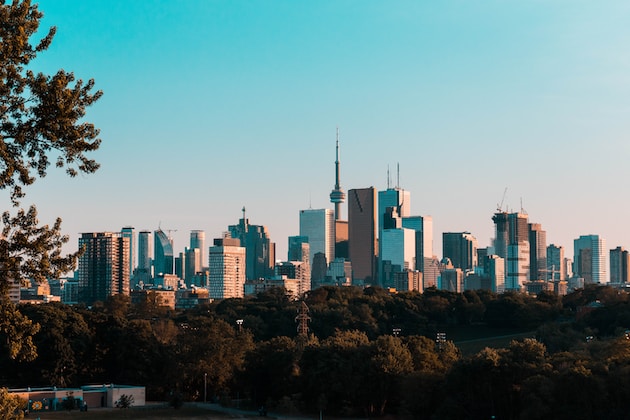
Unique Environmental Considerations For Toronto
In 2010, the city of Toronto adopted its own green standard, the Toronto Green Standard, which addresses the environmental pressures and priorities for the city with performance measures. Similar to LEED certification, Toronto’s own green standard addresses 5 environmental drivers which are divided into performance drivers.
• Air Quality (AQ)
• Energy Efficiency, GHG & Resilience (GHG)
• Water Balance, Quality & Efficiency (WQ)
• Ecology (EC)
• Solid Waste (SW)
As innovative green standards, the LEED rating system and the Toronto Green Standard share similar objectives and are complementary. Certain credits even overlap in design intent.

LEED Certification For Buildings
LEED certification framework is a holistic approach to sustainability, covering the design, construction, operation and maintenance of buildings. By implementing LEED, owners and developers can expect a high-performing, cost-effective and resilient building.
LEED certification for buildings is awarded based on the points or credits earned for green building strategies applied across nine categories.
Here is more information on the validity period of LEED certification.
Getting LEED Certified In Toronto, Canada
The LEED certification process is similar worldwide. First, you should determine which LEED rating system – whether it is LEED BD+C or O+M or other systems – you are eligible for. Afterwards, register the project at LEED Online. Note that registration comes with a fee. Once the registration is complete, you can prepare and submit the application. Canada Green Building Council (CAGBC) handles the review and is ultimately responsible for the decision.
LEED Accreditation For Professionals
In today’s design and construction sector, sustainability is more than a concept. It is a vital element throughout the project life cycle. Understanding the necessity of it, the AEC industry is relying heavily on professionals skilled in sustainable practices. The easiest way to prove one’s knowledge and experience is to attain LEED credentials.
For any professionals starting out in sustainable design, LEED Green Associate is the first step. This accreditation from USGBC proves the skills and competency in sustainable building. It is comprehensive of the core principles to be implemented in design and support the team with LEED projects. After obtaining the LEED Green Associate, one can enhance their expertise in green building systems by pursuing LEED AP (Associate Professional), a credential that will no doubt boost career prospects.
LEED AP is a more advanced accreditation with 5 different specialities for each major scope in design and construction. Most architects obtain either Building Design + Construction (BD+C) or Interior Design + Construction (ID+C). The other 3 specialties are Operations + Maintenance (O+M), Neighborhood Development (ND) and Homes.
Growing Interest In LEED in Toronto & Canada
CAGBC
We have already mentioned this name a few times, but what exactly is CAGBC and its role? This organization supports AEC professionals with everything related to green building. That includes providing standards, verification, certification, and training. CAGBC is leading Canada in the implementation of LEED and other sustainability practices.
LEED Certification Toronto: 6 LEED-Certified Projects With Amazing Features In Toronto
The Environment Journal reports that in 2021 alone, Canada certified 205 projects according to the LEED rating system. They range from new constructions to homes across all rating levels.
1. Aqualina, Bayside Toronto
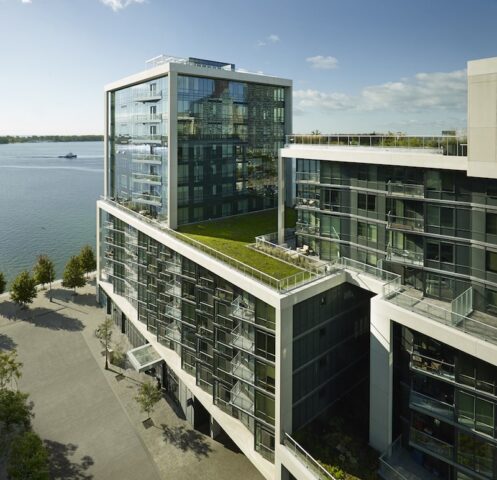
Part of the Bayside development south of Queens Quay, Aqualina is a mixed-use development project that has become Toronto’s first ever LEED Platinum-certified residential building in 2020. It was designed by Arquitectonica as part of the first phase of the Bayside waterfront district. In addition to the LEED certification, the 13-storeys Aqualina also received the Inspiring Home Award by CAGBC for its innovative NetZED suite. The design focuses on reducing energy consumption in condominium units and increasing energy harnessing from solar panels.
2. Waterfront Innovation Centre
As the home to Toronto’s technologically creative and innovative companies and institutions, the Waterfront Innovation Centre is an office complex, designed with the employees and collaboration as the focus. Sensors and automation controls to monitor occupancy and lighting levels are some of the features that earned it the Platinum certification under the LEED BD+C rating system in September 2023.
3. TD Centre Complex
Another first in its typology to receive the LEED Platinum certification was the TD Centre Complex. The recognition was achieved all the way back in 2012 under the LEED Operations + Maintenance for Existing Buildings. It had previously received the Gold certification under Existing Buildings back in 2010 for its office complex. This recognition also made a new record as the first of its kind in Canada.
4. Kipling Bus Terminal
This newly certified transit hub was designed and constructed with the aim of achieving the LEED certification. Two years after this completion, the project was awarded the LEED Gold certification BD+C for New Construction. Sustainable construction with renewable and low-emission materials was an important component of the design to meet the LEED certification requirements. The green roof system of drought-resistant grass with soil that requires minimal maintenance provides a much-needed horticultural element within the transit environment.
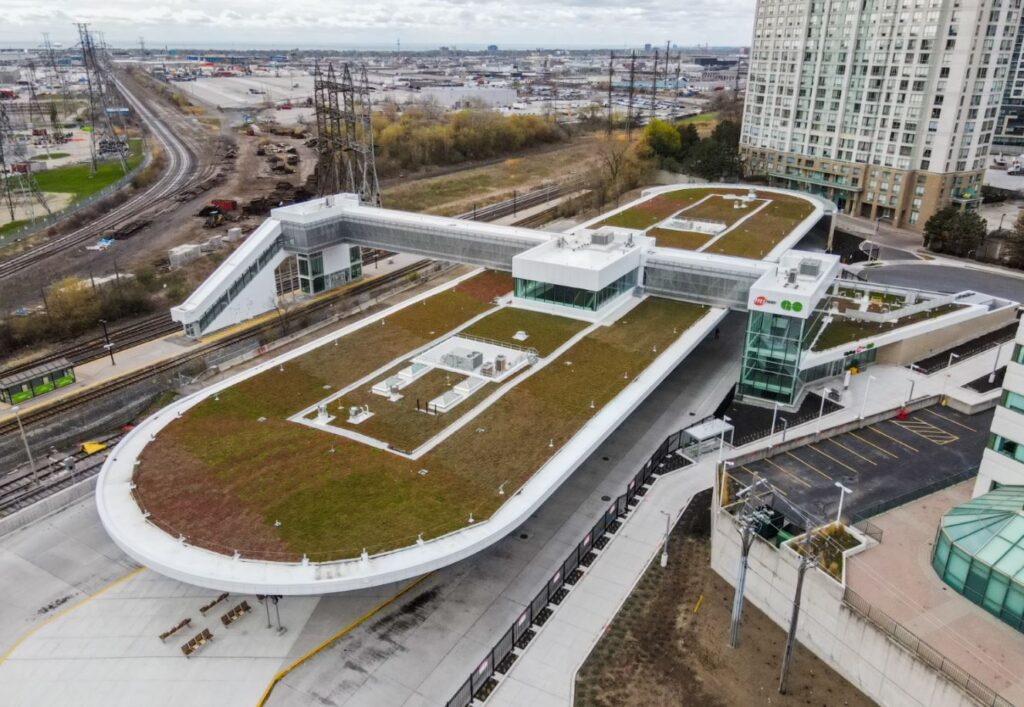
5. Prada Toronto
LEED certification doesn’t apply to just whole buildings; even a single interior space like a retail store can also become LEED-certified for the effort to construct and operate sustainably. One such store is Prada, located at Bloor Street West, Toronto. Say what you want about luxury stores and sustainability, but at least Prada is making an effort in its retail built environment. All their LEED certified stores track and manage performance across energy and water consumption, waste management, transportation and human experience. Prada Toronto received its Gold certification in Interior Design + Construction for retail in 2018.
6. World Exchange Plaza
World Exchange Plaza in Toronto has received various prestigious awards for its excellence in sustainable design and practices, modernization upgrades and building management. It is also the recipient of the LEED Platinum certification under Operations + Management for Existing Buildings. The continuous effort to improve the building’s operation and procurement led to a 70% waste diversion rate. The effort was rewarded by the recertification from LEED Gold to Platinum certification.
Although not in Toronto, here is an impressive Gold-certified library in Canada: Surrey City Centre Library.
Where To Get LEED Certification: Toronto’s Prometric Testing Centers
If a candidate wishes to take the exam in-person, he/she can do so at the Prometric Testing Centers. Make sure to select the correct link under the GBCI Prometric webpage. First, choose the right certification exam, key in your location and the desired test date. Instead of choosing just one date, you may choose a time window of 2 weeks. The ProScheduler will display the available test centers within the vicinity.
Taking The LEED Certification Test Online
The certification exams can also be remotely proctored. The remotely proctored online exams use Prometric’s ProProctor application. The candidate will take the exam online as a Prometric proctor oversees the examination remotely. Candidates are required to have a working camera, microphone and a stable internet connection.
The candidates can visit the Prometric web portal to cancel or reschedule the exam appointment. Take a look at our 5-step guide to smartly use Prometric Reschedule to Modify your LEED exam appointment.
Have you made an appointment or planned to do so in the future? Join the Complete Training for LEED Green Associate and pass the exam in 2 weeks! If you want a spoiler of the course, check out our free resource and get a head start.
